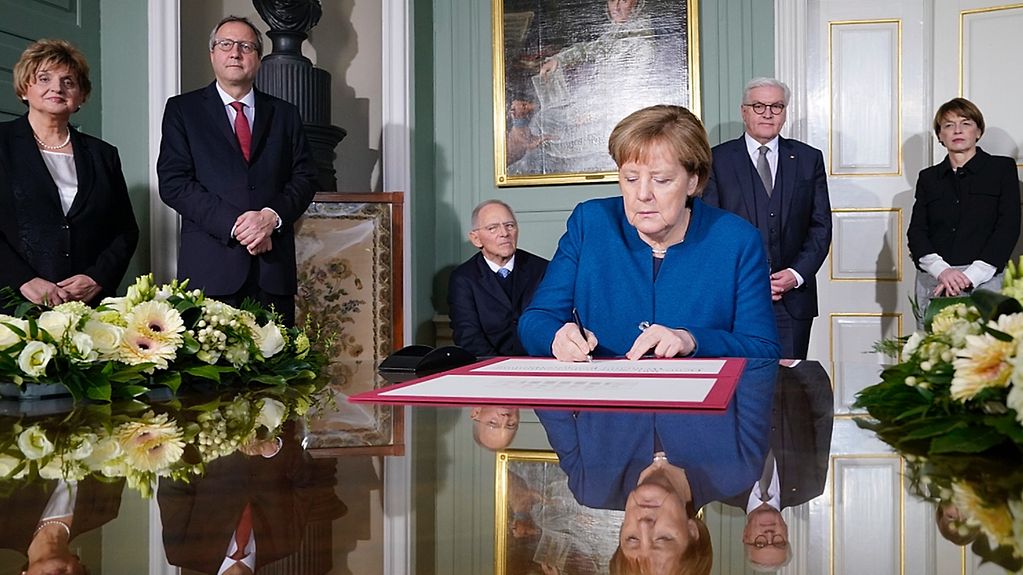100th anniversary of Weimar Constitution
The official ceremony to mark the 100th anniversary of the Weimar Constitution began at precisely 15:15 in Weimar. This was when, 100 years ago on 6 February 1919, the new National Assembly met for the first time. Federal President Frank-Walter Steinmeier, Chancellor Angela Merkel and the leaders of the other constitutional organs of the Federal Republic of Germany celebrated with citizens.
3 min reading time

In Weimar Chancellor Angela Merkel signs the commemorative document.
Photo: Bundesregierung/Denzel
Following the November Revolution, the forced abdication of the Kaiser and the end of the First World War, the new National Assembly met for the first time in Weimar on 6 February 1919. One hundred years later, a ceremony in the Deutsches Nationaltheater (DNT) marked the occasion. Federal President Frank-Walter Steinmeier was the main speaker.
Important step towards democracy
Chancellor Angela Merkel said, "It is extremely moving that we can commemorate the 100th anniversary of the Weimar Constitution here in Weimar today, in the knowledge that it was an important step towards democracy." The new constitution ushered in important new rights, including suffrage for women. In her statement, Angela Merkel also looked back at the failure of the Weimar Republic and the terrible era of the National Socialist regime and the Holocaust.
"The constitution we have today, the Basic Law, which will celebrate its 70th birthday this year, essentially builds on the Weimar Constitution and has learned from the weaknesses of that constitution," stressed the Chancellor. "The Basic Law has built a stable Federal Republic of Germany," she continued.
Lessons from the Weimar Republic
As well as attending the official ceremony, Chancellor Angela Merkel met with 12th grade students from a Weimar secondary school. Within the framework of a workshop on democracy, the students had produced questions about what we can learn from Weimar for Europe today. Angela Merkel said it had been a pleasure "to discuss with young people what democracy means today, and what Europe means to us today, because Europe itself represents what we have learned from the failure of the Weimar Republic and from National Socialism."
It is important to encourage young people not only to feel that they are represented, but to do something themselves for democracy. "Nothing is self-evident. Every generation must fight once again for democracy," stressed the Chancellor. She was delighted that her discussion with the students had demonstrated that this is precisely what young people want to do, and what they will do.
At a workshop on democracy ("Denkraum Demokratie"), young people have the opportunity to develop ideas as to how they can become actively involved in political processes. The aim of the workshop is to strengthen young people’s interest in and understanding of political processes. The workshop is supported by the Federal Ministry for Family Affairs as part of the "Demokratie leben!" (Living Democracy) programme.
The road to the Weimar Constitution
The National Assembly met in Weimar in 1919 in Weimar, because the situation in Berlin was still extremely turbulent. That is why the first democracy on German soil is known as the Weimar Republic. For the first time ever women were able to vote. The age of suffrage was reduced from 25 to 20, making another 20 million people eligible to vote.
The National Assembly was responsible for adopting the new constitution and passing urgent legislation. Its deliberations continued from February until 31 July 1919. The constitution finally came into force on 14 August.
Women and men put on an equal footing
One key constitutional principle was that all state power is derived from the people (Article 1), while others include the division of powers and fundamental civic rights. For the first time ever, women and men had the same civic rights and family rights. In addition, various elements of German and international democratic traditions were incorporated in the Weimar Constitution: representative democracy, in which parliament is elected to rule the country on behalf of the people, the option of holding referenda and presidential democracy with a strong, directly elected president, like the systems in place in the United States of America and France.
Commemorative document signed
As part of the celebrations of the 100th anniversary of the Weimar Constitution, Chancellor Angela Merkel and the representatives of the other constitutional organs also attended an ecumenical church service in the city’s Herderkirche. This was followed by a reception hosted by the state premier and president of Thuringia’s state parliament. Im Weimar’s Wittums Palace, a commemorative document entitled "To mark the 100th anniversary of the first meeting of the German National Assembly and the origins of the Weimar Constitution" was signed in remembrance of the events 100 years ago.